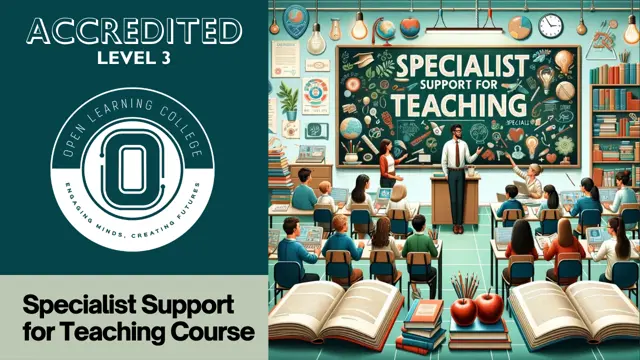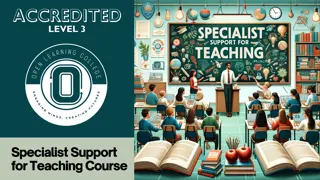
Specialist Support for Teaching (Level 3)
Distance Learning Course, featuring tutor support and AI assistance, available online or as a study pack option.
Open Learning College
Summary
Funding options are available on our website
- Cache & OPA - Free
- Exam(s) / assessment(s) is included in price
- Tutor is available to students
- TOTUM card included in price What's this?
Add to basket or enquire
Overview
Embark on a transformative learning journey with the UK’s most innovative home study provider, offering courses designed to unlock your true potential and facilitate the career change you desire. Access our distance learning courses directly from anywhere, anytime, and acquire industry-recognised Professional Qualifications essential for advancing in your career.
Specifically, explore the flexible and convenient Specialist Support for Teaching (Level 3) course, an ideal way to gain a diploma qualification. Whether you aim for further education, improved job prospects, or expanded knowledge, this comprehensive course allows you to prepare thoroughly for exams or careers through home study. Plus, it’s structured to be accessible and beneficial even if you have no prior knowledge in Specialist Support for Teaching.
Specialist Support for Teaching is a comprehensive program designed to equip aspiring teaching assistants with the necessary skills and insights to support students effectively in various learning environments. This course delves into the fundamental principles of inclusive education, emphasizing strategies to cater to diverse learning needs. Through a blend of theoretical knowledge and practical application, participants gain insights into different learning styles, behavioral management techniques, and methods to support individuals with special educational needs. The course aims to foster an inclusive teaching environment, nurturing the growth and development of every student.
Achievement
Certificates
Cache & OPA
Digital certificate - Included
This is a dual-certification course and you will therefore receive two qualifications. This course is certified by Open Learning Collegevia the Open Pathway Accreditation Programme & NCFE CACHE.
NCFE CACHE (Council for Awards in Care, Health and Education) are a leading awarding organisation specialising in in the care and education sector. CACHE endorse a range of qualifications to individuals and organisations throughout the UK and internationally.
1. You will receive your accreditation directly from NCFE, once you have successfully completed your course (certification fees are included in the course fee).
2. You will receive the Open Pathway Accreditation Diploma (OPA.dip) from Open Learning College.
Course media
Resources
- Specialist Support for Teaching Level 3 (CACHE) Course -
Description
Course Key Topics
the Specialist Support for Teaching (Level 3) course is divided into 16 modules.
Module 1: Schools and colleges as organisations
- The structure of education from early years to post-compulsory education.
- How schools and colleges are organised in terms of roles and responsibilities.
- Teamwork in schools and colleges.
- Educational ethos, mission, aims and values.
Module 2: Support health and safety in a learning environment
- Plan and provide environments that support children and young people’s health and safety.
- Recognise and manage risks to health, safety and security in a learning environment or during off-site visits.
- Support children and young people to assess and manage risk for themselves.
- Appropriate responses to accidents, incidents, emergencies and illness in the learning environment and during off-site visits.
- Own role in assisting in the administration of medication.
Module 3: Understand how to safeguard children and young people
- Legislation, guidelines, policies and procedures for safeguarding children and young people.
- How to work in partnership with other organisations to safeguard children and young people.
- The need to ensure children and young people’s safety and protection in the learning environment.
- How to respond to evidence or concerns that a child or young person has been abused or harmed.
- How to work with children and young people to support their well-being.
Module 4: Develop professional relationships with children, young people and adults
- The principles of developing positive relationships with children, young people and adults.
- Legislation, policies and procedures for confidentiality and sharing information, including data protection.
- Develop professional relationships with children and young people.
- Communicate with children and young people.
- Develop professional relationships with adults.
- Support children and young people in developing relationship.
- Support inclusion and inclusive practices in work with children and young people.
Module 5: Understand how children and young people develop
- The expected pattern of development for children and young people from birth to 19 years.
- The factors that influence children and young people’s development and how these affect practice.
- Monitor children and young people’s development and interventions that should take place if this is not following the expected pattern.
Module 6: Support positive behaviour in children and young people
- Policies and procedures for promoting children and young people’s positive behaviour in a learning environment.
- Promote positive behaviour.
- Manage behaviour that challenges in a learning environment.
Module 7: Support children and young people during learning activities
- Contribute to planning learning activities.
- Prepare for learning activities.
- Support learning activities.
- Observe and report on learner participation and progress.
- Contribute to the evaluation of learning activities.
Module 8: Support English and maths skills
- Identify learner needs for English and maths support.
- Provide English support to help learners access teaching and learning.
- Provide maths support to help learners access teaching and learning.
Module 9: Support the use of ICT in the learning environment
- Policy and procedures for the use of ICT for teaching and learning.
- Prepare ICT resources for use in teaching and learning.
- Support the use of ICT for teaching and learning.
Module 10: Support assessment for learning
- Purpose and characteristics of assessment for learning.
- Use assessment strategies to promote learning.
- Support learners in reviewing their learning strategies and achievements.
- Contribute to reviewing assessment for learning.
- Maintain learner records.
Module 11: Engage in personal and professional development
- What is required for competence in own work role.
- Reflect on organisational practice.
- Evaluate own performance.
- Agree a personal development plan.
- Use learning opportunities and reflective practice to contribute to personal development.
Module 12: Support children and young people’s speech, language and communication
- The importance of speech, language and communication for children and young people’s overall development.
- The role of support staff when supporting speech, language and communication development in the learning environment.
- Provide support for the speech, language and communication development of children and young people in the learning environment.
- Contribute to maintaining a positive environment that supports speech, language and communication.
Module 13: Understand how to support bilingual learners
- Contribute to the assessment of bilingual learners.
- Support bilingual learners to access the curriculum.
Module 14: Understand how to support learning of children & young people with special educational needs and disabilities
- The principles of inclusive practice and the rights of disabled children and young people and those with special educational needs.
- Obtain information about individual needs, capabilities and interests of disabled children and young people, and those with special educational needs.
- Special educational needs of children and young people with cognition and learning needs.
- Special educational needs of children and young people with emotional, behavioural and social development needs.
- Special educational needs of learners with sensory and/or physical needs.
- The kinds of strategies needed to support children and young people with special educational needs and disabilities.
Module 15: Support children and young people during transitions
- The range and impact of transitions that children and young people may experience.
- Recognise and respond to transitions in children and young people’s lives.
- Support children and young people to manage transitions in their lives.
Module 16: Support the role of play, leisure and extra-curricular activities for children and young people
- The nature and importance of play and leisure.
- Own role in relation to the requirements of play and leisure activities.
- Balance risk and challenge with the benefits of the play and leisure opportunity.
What Will You Learn?
- In the Specialist Support for Teaching program, participants will delve into comprehensive modules covering a spectrum of topics crucial for supporting students with special educational needs (SEN).
- This includes understanding various disabilities, learning differences, and developmental challenges that impact a student's educational journey.
- You'll explore effective strategies for assisting students with their learning, behaviour, and social interactions within a classroom setting.
- Additionally, the curriculum addresses how to collaborate with educators, parents, and external specialists to create tailored learning plans, implement assistive technologies, and adapt teaching methods to meet diverse learning needs.
- The course aims to equip individuals with the practical skills and knowledge required to provide inclusive and personalized support, fostering an environment conducive to the holistic development of students with SEN.
Who is this course for?
- The course in Specialist Support for Teaching is designed for educators, teaching assistants, or individuals aspiring to work closely with students having special educational needs (SEN).
- It caters to those seeking a deeper understanding of diverse learning requirements, aiming to support and facilitate the educational progress of students with disabilities or SEN.
- This program targets individuals keen on enhancing their expertise in adapting teaching methodologies, creating inclusive learning environments, and implementing specialized strategies to aid students in overcoming educational barriers.
- It's well-suited for those passionate about making education accessible and meaningful for every student, irrespective of their learning challenges.
Requirements
- The good news is that no prior learning knowledge or experience is essential to take this course. This course is openly available to anyone wishing to learn more about Specialist Support for Teaching (Level 3) and would like to take part in a highly rewarding distance learning study course.
- We believe that everyone should have the opportunity to expand their knowledge and study further, so we try to keep our entry requirements to a minimum.
Career path
A career in education consultancy can give you the freedom to shape your own career path while realising your passion for education and the learners’ journey
Questions and answers
Reviews
Currently there are no reviews for this course. Be the first to leave a review.
Legal information
This course is advertised on reed.co.uk by the Course Provider, whose terms and conditions apply. Purchases are made directly from the Course Provider, and as such, content and materials are supplied by the Course Provider directly. Reed is acting as agent and not reseller in relation to this course. Reed's only responsibility is to facilitate your payment for the course. It is your responsibility to review and agree to the Course Provider's terms and conditions and satisfy yourself as to the suitability of the course you intend to purchase. Reed will not have any responsibility for the content of the course and/or associated materials.


